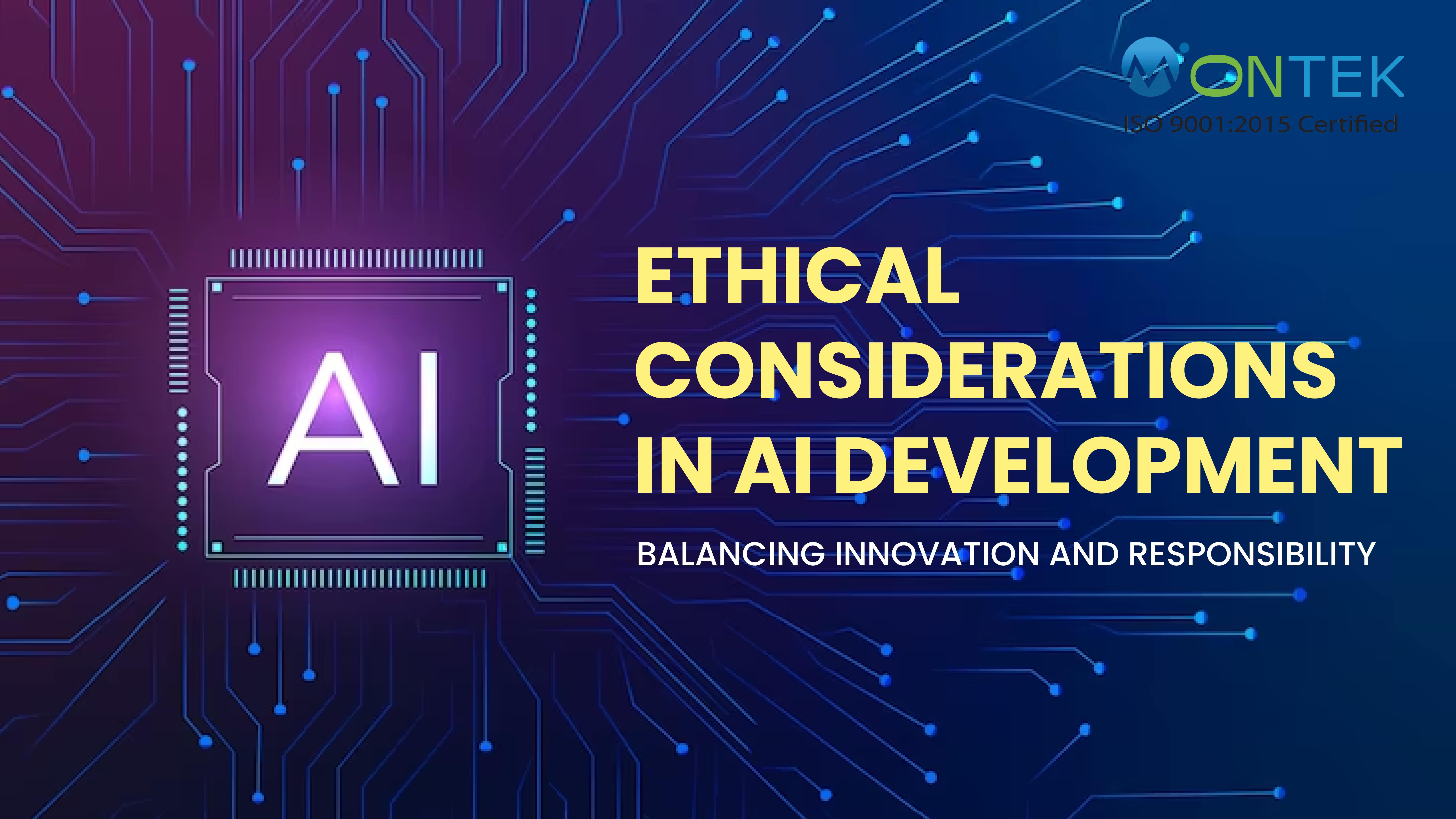
26
JulEthical Considerations in AI Development Balancing Innovation and Responsibility
Artificial Intelligence (AI) has rapidly progressed, transforming various aspects of our lives and presenting unprecedented opportunities. However, as AI development becomes increasingly pervasive, ethical considerations surrounding its development and deployment have come to the forefront.
Balancing innovation and responsibility is crucial to ensure that AI technologies are developed and utilized in a manner that respects ethical principles, protects user rights, and fosters trust.
In this blog, we will explore the key ethical considerations in the best AI development services and discuss strategies for achieving a harmonious balance between innovation and responsibility.
Transparency and Explainability :
One of the fundamental ethical considerations in artificial intelligence development is ensuring transparency and explainability. AI algorithms should be designed in a manner that enables users to understand how they function, how decisions are made, and the underlying reasoning. Transparent AI systems foster trust, mitigate biases, and allow for meaningful human oversight.
Fairness and Bias Mitigation :
AI algorithms can unintentionally perpetuate biases present in the data used for training. Ethical artificial intelligence development demands a focus on fairness, ensuring that the systems treat all individuals and groups equitably, regardless of factors such as gender, race, or socioeconomic background. Techniques like data preprocessing, algorithmic auditing, and diversity in development teams can help identify and mitigate bias.
Privacy and Data Protection :
Python development company in Pune provide AI systems that often rely on vast amounts of user data for training and improving performance. Respecting privacy rights and protecting user data is of utmost importance. Ethical Artificial intelligence development entails implementing robust data protection measures, obtaining informed consent, and anonymizing or securely handling sensitive information. Striking the right balance between data utilization and privacy preservation is critical.
Accountability and Responsibility :
AI developers must embrace accountability for the impact of their technologies. Establishing clear lines of responsibility and ensuring mechanisms for addressing concerns, errors, or unintended consequences is essential. Implementing safeguards, such as error reporting mechanisms, algorithmic auditing, and ethical review boards, can help ensure accountability in artificial intelligence development and deployment.
Human-Centric Design and Empathy :
Ethical artificial intelligence development should prioritize human-centric design and empathy. Systems should be created with a deep understanding of user needs, values, and potential impact. Taking into account human values, cultural diversity, and societal context helps develop AI that aligns with human well-being and respects social norms.
Collaborations and Stakeholder Engagement :
Addressing ethical considerations in artificial intelligence development requires collaboration and engagement with various stakeholders, including users, policymakers, researchers, and advocacy groups. Collaborative efforts foster diverse perspectives, allow for comprehensive ethical evaluations, and contribute to the development of industry-wide standards and best practices.
Continuous Evaluation and Adaptation :
Ethical considerations in Artificial intelligence development are dynamic, requiring ongoing evaluation and adaptation. AI developers should regularly assess the ethical implications of their systems, learn from feedback, and iteratively improve the technology. Embracing a culture of ethical reflection and continuous improvement helps address emerging challenges and stay at the forefront of responsible Artificial intelligence development.
Ethical considerations in Artificial intelligence development are essential to harness the transformative power of AI while protecting user rights, promoting fairness, and ensuring accountability. Balancing innovation and responsibility in Artificial intelligence development requires transparency, fairness, privacy protection, accountability, human-centric design, collaborations, and continuous evaluation.
By incorporating these ethical considerations into the development process, we can build AI technologies that positively impact society, foster trust, and pave the way for an inclusive and responsible AI-powered future.
So partner with Montek Services, the best python development company in Pune to get the best ethical python development services for your business.
Contact Montek Services today and get a quote for your business.
Author -

Software Engineer

